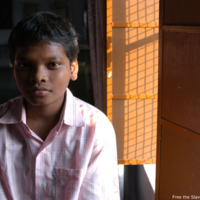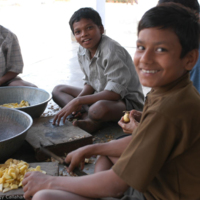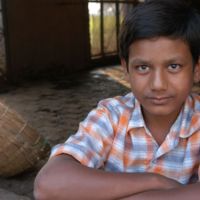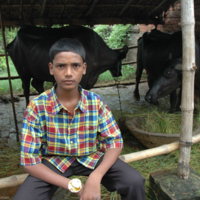
I will absolutely not let my parents send any of my brothers to the loom. When it comes to the loom owners, I was badly beaten. They did not provide any of the facilities they talked about in the village. In fact, they made us work day and night on the loom. I will make sure that none of my brothers get caught in the same trap again.
Before I was taken I did not go to school. I would take the cattle of my neighbors for grazing. I would have fun. We would go in a large group of boys. We would just let the cattle graze while we had fun and went and did our thing. In the village I had five brothers, my mother and my sister. I was in the village when a man came and offered food, clothing, shelter, money. My parents sent me even though I didn’t want to come. I didn’t know what was happening to me—where I would land up. I was very scared. The journey took a long time. I didn’t know how to weave but I was taught by being beaten up repeatedly—they beat me up each time I made a mistake. I was beaten with the wooden portion of the knife. I wasn’t allowed to go out to play outside, and had no friends. The food was really bad, stale and two days old. I didn’t like it at all.
I always had hope that I would be rescued but nobody came while I was there. Once I got a call from father. He asked if I was alright. I lied and said I was ok. I didn’t want my father to worry about me. I would think about running away every night. One morning something snapped. I took my blanket and ran for my life. I jumped on a tractor and it took me to a place I didn’t know. A woman sheltered me for the night and sent me to her father’s house. The owners of the loom chased me. I was lucky and lived with my parents for the next two years. The loom owner actually came to the house but didn’t see me. My brother tried to escape before me—he was caught and beaten.
What I have learned at the Ashram, I will take back home. How to behave, not only with myself but also with others. That is what I want to take home, interaction with other people. I can read now a little bit. When I do go back, I intend to enroll in school and learn a whole lot more. The happiness and joy that I have found at the Ashram may never come again. I don’t think I can find the joy back home. I will go but I know I will have to come back here one day. Now there are no thoughts about running away in my mind. I am just so happy here on my daily basis. I just think about my work and what tomorrow will bring. The work I do here I want to continue when I go home. I want to work as an electrician.
I want to tell the government that these kids exist. It’s time for you to take these children out of the loom. And it’s not so difficult. All you need to do is surround the loom on all sides, come in and take the children. That’s all you have to do.
Narrative as told to Peggy Callahan for Free the Slaves, October 31, 2004, at Bal Vikas Ashram, in Allahabad, Uttar Pradesh, India.


